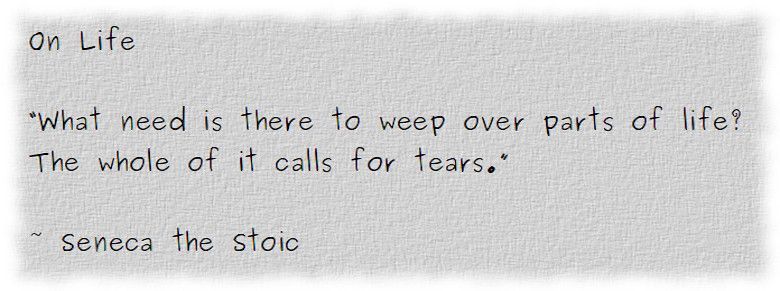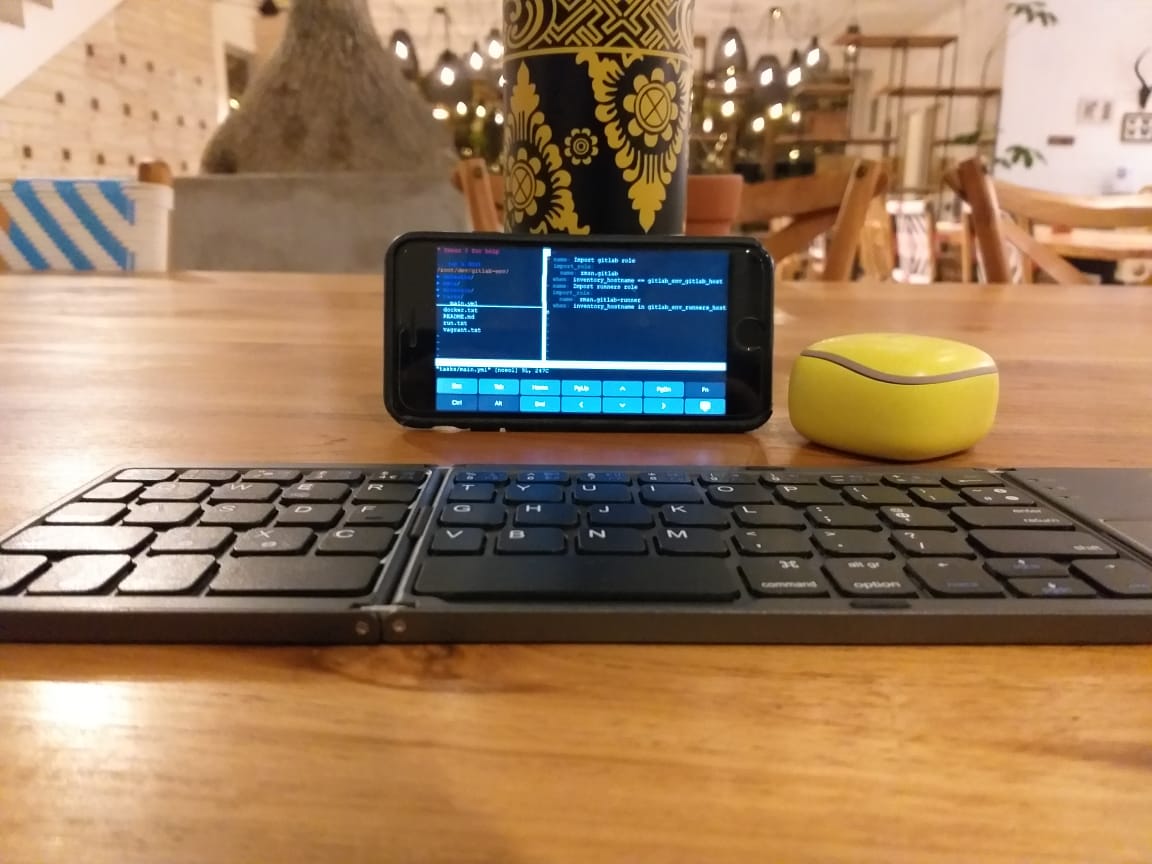Digest - Stoicism and building software without a real computer
Stoic philosophy, values, engineering without a laptop.

Back!
Some learnings
Planning
Planning is the art of finding consistency in dealing with inconsistency. Instead of making a plan and expecting it to be followed, make a plan to take a direction and follow the rocky path to the goal. Take a moment to look behind you, and forward, and decide what steps to take.
In terms of my own posting, I'll have to adjust again. I'll be improving the approach: only a short sum up of what I read, with a strict format and less length. The time to produce should be under 30 minutes a week, next to the reading. The stuff I research will be done in the form of long reads or a series with more dedication.
2 weeks of consistently interrupted sleep
Sleeping in 5 to 8 phases of 1 to 1,5 hours instead of 8 hours straight (or more) is a completely different experience from sleeping 6 to 7 hours instead of 8. Some observations comparing interrupted sleep with simple lack of sleep:
- I felt less tired but more intellectually restrained;
- I was more open to chaos, and a lot less structured in thinking and dedication;
- I experienced a severe lack of focus, but enough motivation to work;
- Coffee worked better than with lack of sleep;
Note: The observations aren't taken from a mentally or physiologically neutral stance, as I had an eye infection that impaired my overall physical and mental stability.
As an engineer, you don't need a laptop
Not having my laptop for more than a week got me to forcibly get creative. As a result, I've found that I can work productively (even more productively, I'd argue) from the terminal only, using a remote server that runs vim/tmux and a load of other configurations to make life better. The only thing you need is a terminal emulator and an SSH/mosh client (mosh is a neat replacement for traditional ssh that ditches many connectivity challenges! I use it happily now).
You can use a Bluetooth keyboard and a tablet, smartphone, or raspberry pi as a development environment. No more worries about closing your laptop, losing state, or more importantly: not having enough RAM/disk/CPU. And it's cheaper while being completely integrated with the cloud! There are some challenges like file sharing, but I have some tools in mind I could build for that.

Random thoughts
- Use your senses to fill up time! They are the ultimate game and you always have them with you
- Try this: notice something you are not looking for! Or try to distinguish 3 smells consciously during the day. Or sit somewhere and sketch the view. Look at or through an object (window?) for 5 minutes that you’ve never seen
- Not improving in a changing world is more dangerous than changing. So change.
- 'Awesome' is not as simple a concept as it seems, looking carefully at its meaning: being in awe. In its full context. Being in a state of complete awe towards something is a very valuable idea.
- Use voice messages purposefully - think about the content before you send them. Voice messages cost the listener quite some time, and often aren't effective for others.
Books, articles, podcasts, videos
The art of noticing on 'Art of manliness'
The art of noticing is an easily overlooked skill over how we overlook the beautifully ordinary things around us.
The book is on my list of things to read without a doubt. A nice insight from this episode was that we have constant entertainment around us. We're just not training the muscle of noticing those things actively, as we are inside of our own minds so much. A practice I am integrating into my morning routine thus is a 2-minute session of noticing. By doing this every morning, I can increase the amount of time I spend noticing the fascinating experiences of seemingly benign things around us. When you have the chance to look at something truly aesthetically detailed and/or pleasing, maybe take 5 full minutes to just watch it.
How to think like a roman emperor by Donald Robertson (audiobook)
A gem. It's written by someone that's a specialist in CBT (Cognitive Behavioural Therapy) and has a MA in Mental Philosophy. Next to a great narration of the story behind Stoicism and Marcus Aurelius by the author himself, he gives a psychological, historical, and philosophical approach to practice working on improving your mental health. From dealing with anxiety, addictions and to just being a happier person, there are amazing insights into Stoic philosophy and Robert's take on it. I'm working on a long read on this topic, together with a long read on emotions.
Stoics in a nutshell: Stoics were committed to action in the service of wisdom and justice. It teaches us how to reconcile a commitment to determined action in the service of our fundamental values and principles with emotional acceptance so that we don’t become upset if we encounter setbacks or were thwarted along the way. The most important thing to stoics is the intention to do good in the world. - Donald Robertson on the Art of Manliness
Good habit: Ask yourself often: What kind of person do I hope to be? What would a truly wise person do?
Rituals are your personal grades: Set rituals, morning and evening, that allow you to constantly improve.
Your concept of who you are is f*cking you up (Mark Manson)
Values define who you are. What we are is an aggregation of what we choose to value in this world. Your actions will be defined by the things you value. It's easy to miss that your values aren't facts, they are actually decisions. Maybe not conscious, but completely and undeniably your personal responsibility nonetheless.
If you are aware of the things you value, you can consciously decide what you value. Do you value money? Do you value intimacy? Do you value challenges?
A good trick is to ask yourself: what would happen if I stopped valuing this thing? Do you want to let go of desire?
Things to try:
Write down your medium-term goals (2 years +). Ask yourself: why do you want those goals?
Write down what you're grateful for. Ask yourself: Why am I grateful for these things?
Three laws of emotion, emotional analogies on Newton's laws:
I added what they mean to me as personal notes.
- For every action, there is an equal and opposite emotional reaction → you're a reactive machine;
- Self-worth (or identity) equals the sum of our emotions over time → You are a collection of what you feel. Control your experience, control your life;
- Our identity will continue to be our identity until new experience acts against us → Your character is only really shaped by feedback loops in the form of challenges;
My biggest takeaway:
Choose the right problem to throw yourself at, consistently. Reflect on what problem it might be. The greatest virtue is how we manage our own mind: you will have to solve problems in any case.
Quotes
- The overlooked is the beginning of creativity - Rob Walker
- Caring about something is the ultimate goal of attention - Rob Walker
- No plan survives contact with the enemy (DevOps)
- Beware of little expenses. A small leak will sink a great ship - Benjamin Franklin
- It's not what happens to you, but how you react to it that matters - Epictetus
Links
- When you're traveling and don't like interruptions in SSH: https://github.com/mobile-shell/mosh
- Cool OSS to open up market making: https://github.com/coinalpha/hummingbot
- Making Notion more awesome: https://github.com/jamalex/notion-py
- Slack through the CLI: https://github.com/regisb/slack-cli
- Harbor: An open-source trusted cloud native registry project that stores, signs, and scans content - https://github.com/goharbor/harbor